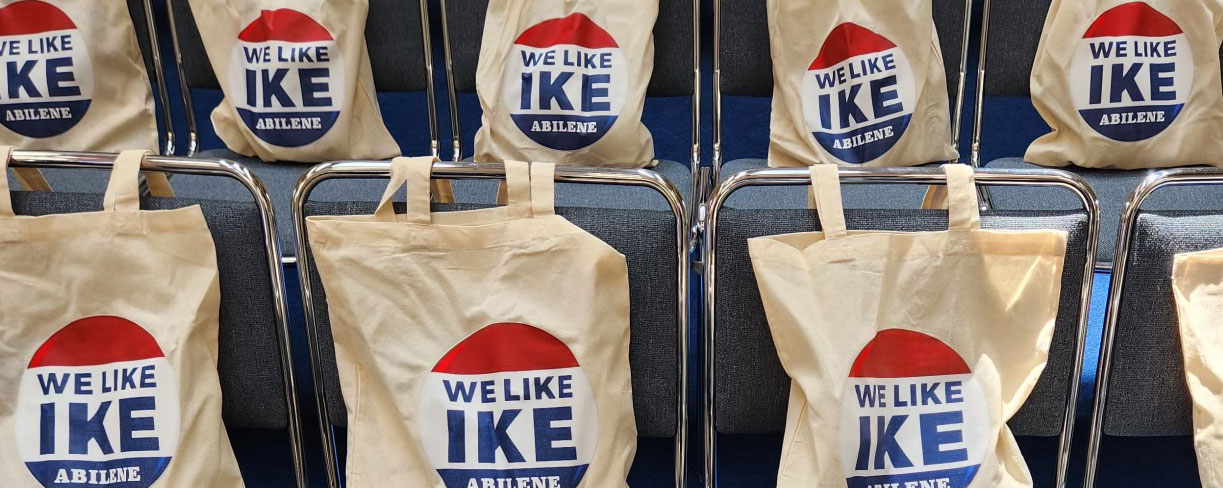
Abilene City Commission & USD 435 School Board Candidates Answer Questions Submitted from The Driving Dickinson County Partnership Members
October 29, 2021
Abilene City Commission Candidate Q&A
All candidates for Abilene City Commission whose name will appear on the ballot for the November 2nd, 2021 elections were provided the following list of questions submitted anonymously by members of The Driving Dickinson Partnership to answer. Their individual responses are listed below. Candidates are: Incumbent Chris Ostermann, Incumbent Trevor D Witt, John Kollhoff, and Wendy Miller. There are 3 seats up for election.
Q: What do you see as the biggest issue facing the city in the next few years?
John Kollhoff: “balancing supply and demand in the labor and housing markets.”
Chris Ostermann: “Originally I would say the Highlands; but having viable city commissioners candidates that actually work in Abilene KS. The last two years have been difficult due to the inexperience, and the lack of networking due to not working in the community. During that time there were two times that items I requested to be tabled because of lack of information. Both requests to be tabled were denied - you now have a chicken ordinance; and another first floor conditional use for the downtown business district. Why would you not allow items to be tabled? The only answer that makes sense is a private agenda, and lack of transparency. In the past the City of Abilene has had city commissioners that were invested and worked in the community, and the city saw improvement.”
Trevor D Witt: “The number one issue facing the city is the attitude of negativity. We have many challenges facing the city, including but not limited to the Highlands development, childcare shortages, and storm water drainage. However, we cannot solve those problems well without city staff, citizens, and the city commission working together, maintaining a positive attitude, and being gracious towards one another. With the pandemic, inflation, and political divisiveness of the past couple of years, I see a lot of negativity in Abilene. This problem is not exclusive to Abilene, but I hope to rise above it to improve our city. I try to live this out by checking my pride, listening to others, and attributing reasonableness to those I disagree with.”
Wendy Miller: "The biggest issue facing the city for the foreseeable future is the economic uncertainty from COVID-19."
Q: What is your opinion on a mill levy that was set for the library?
John Kollhoff: “I don't really have any opinion on the library mill levy. I think libraries are an important part of a community, and I will fund it adequately. I DO believe that the Abilene Public Library needs to be more responsive to the needs of the community, in part by being open on days that kids are not in school and on bank holidays.”
Chris Ostermann: “Abilene's Public Library had communication issues prior to my being a City Commissioner. One of the roles the Mayor has is to attend the monthly meetings for the Library. The presentation for their budget a few years ago was met with questions since the mill levy had jumped. In 2019 the Mayor could not attend any of the meetings, and the outcome was negative. In 2020 as Mayor I went to almost every meeting to bridge the communication between the city and the Library. I also brought recommendations from the Finance Director for the budget for 2021 to the meetings. In 2020 a lot of positives as the Library board worked to meet the suggested 2021 budget; and the energy was positive as it was a working relationship. When I handed over the gavel to our current Mayor, I suggested that we would talk about what happened in 2020 and prior; so he could move forward with the Library Meetings and would be informed. He responded that he was "good". At the next city meeting I tried to bridge the information again what happened to the Library in 2020; and the Mayor replied that the Library was taken care of. It is not fair to the Library to have not been included in the discussions for the mill levy (they should have been included in the study session when it was proposed); or not have the Mayor being an informed active participant on the Library Board.”
Trevor D Witt: “Forgive me if I get too technical in my answer, but I believe the following background is necessary to explain my thinking. The city commission adopted a mill levy cap on the library at 8.22 mills, which contributes a little over half a million dollars to the library budget at the current assessed valuation. I voted for this mill levy limitation because it will provide city staff with an estimated budget for the library when developing the city's budget. Libraries have an interesting structure in Kansas. For Abilene, our library board controls the library budget. Aside from the mayor, the rest of the library board serves by appointment by the city commission. Before the mill levy cap, the library board could raise the mill levy if they chose to, and the city commission had no say in the matter. This put the city in a difficult position because the library budget passes through the city budget. It is a peculiar structure to have a majority appointed, not elected, board that has taxing authority. It is also important to note that the city owns and maintains the library building, not the library. The mill limitation will require the library to be proactive when forming its budget. If they need to increase the mill levy, then they can present a justification to the commission for consideration. This extra step may be cumbersome, but I think it is a policy that contributes to greater accountability of the library budget.”
Wendy Miller: "I believe in a check and balance system with every department operating within a appropriate budget. The mill levy helps the library to determine how much funds are allocated and to plan accordingly for the upcoming year."
Q: What do you see the city’s role as it pertains to downtown revitalization?
John Kollhoff: “I believe that the role of the city government is downtown revitalization is the same as it is for development in currently undeveloped land. We need to foster an environment that allows businesses and developers to be effective.”
Chris Ostermann: “We need to change our outlook on investing in downtown. Currently a business at 2nd and Cedar was sold by Reynolds Real Estate. That same building was listed 3 years ago at $120,000; and was sold recently for $22,500. There needs to be a a progressive turn around for our downtown. The latest Comprehensive Development Plan for Abilene KS is 2006. There needs to be a new guidance to help Abilene's vision for our future. Developing a new Comprehensive Plan will promote positive change that will enhance the quality of life of our residents; and that would include preserving our downtown and promote Abilene's rich history.”
Trevor D Witt: “The city's next step in downtown revitalization is better communication on the existing incentives for the area. This may take the form of informational mailers or lunch and learn sessions. The first active incentive is the Neighborhood Revitalization Program, which provides a property tax rebate on eligible improvements to properties. You can find more information about it here https://www.abilenecityhall.com/622/Neighborhood-Revitalization-Program. The other program in the works uses a rural housing incentive district for second-story (and above) dwellings. This will provide another means to provide tax relief on improvements. These two programs are ways that the city can incentivize improvements on privately owned downtown properties. Regarding the public infrastructure of downtown, the city continues to make slow but steady progress on the roads, water, sewers, sidewalks, parks, benches, and beautification (flowers). Two large projects being addressed are the parking lots by the civic center and storm water drainage issues.”
Wendy Miller: "The city plays a major role in downtown revitalization. They have comprehensive strategies in place to ensure continuous growth all while preserving our history."
Q: What changes could you see the city making to encourage business growth for new and existing business in Abilene?
John Kollhoff: “I think there are good incentives in place. I believe we should review them occasionally to make sure we are competitive with the region.”
Chris Ostermann: “The City of Abilene needs viable support staff to help businesses make the right decisions. Too many times businesses have been misinformed; and it creates issues. If any Business Investor contacts the city of Abilene, we need the appropriate answers to provide a working relationship for new and existing businesses. The City of Abilene still does not have a Director for Planning and Zoning. There was a viable Director who was let go because of the previous city manager. This same individual is now working for Dickinson County and Saline County in the same role as he had working for the City of Abilene. There needs to be accountability; and that is the role of the City Commission to hire the city manager that will provide the city of Abilene the tools for business growth in our community.”
Trevor D Witt: “The main thing the city needs is a straightforward business incentive application process. We need a process that makes it very clear what incentives we offer for specific business prospects. With a process like this, eligible businesses will know precisely what they have to work with if they want to move quickly. The city is always adaptable to more complex and strategic projects, but those negotiations take time.”
Wendy Miller: "My aim, if elected to the city commission, is to join forces with our business community to fuel the growth of our city. Striking a balance between business interests and the city’s strategic needs is critical for long term planning."
Q: How can the city commission best support new businesses and new industries interested in coming to Abilene?
John Kollhoff: “I feel that we can best support new businesses and industries by supporting the ones that we currently have, to foster the environment that will encourage development. success breeds success.”
Chris Ostermann: “There needs to be housing that will provide for the new employees. Pending is the Rural Housing Incentive District, which would include the Highlands and the Downtown Business District. At the Kansas League of Municipalities conference Emporia has gone through this process with positive results. Abilene needs to be progressive in building housing (multi-family) in a short period of time. There should not be an automated answer that there is a need; the answer is what can we do to make it happen? At that same meeting we were given contacts (Kansas Department of Commerce - just an example) to proceed to make it work for Abilene.”
Trevor D Witt: “This is a combination of my previous two answers. The city needs to get better at outreach and communication about existing incentives, and we need efficient processes for implementing those incentives.”
Wendy Miller: "The city commission can best support new businesses and new industries interested in coming to Abilene by having clear, transparent and consistent communication."
USD 435 School Board Candidate Q&A
All candidates for USD 435- Abilene School Board whose name will appear on the ballot for the November 2nd, 2021 elections were provided the following list of questions submitted anonymously by members of The Driving Dickinson Partnership to answer. Their individual responses are listed below. Candidates are: District 1, Pos. 4: Incumbent Kyle Becker, Megan Armstrong; District 2, Pos. 5: Incumbent Christopher West; District 3, Pos. 6: Incumbent Jeff Bathurst.
Q: What is your vision for education in the district?
Megan Armstrong: "I would like to see Abilene Schools be the first choice for parents and students based on excellent academics, opportunities to connect with our community and a record of success as students graduate. Whether our students choose to directly enter the workforce, join our Armed Forces or seek a degree in higher education, the schooling they received from our district should prepare them to face the challenges of adulthood and pursue opportunities for a brighter future. Ideally, communication between parents, teachers and administrators would be timely and relevant with each of these stakeholders focused on student success. Our teachers would be supported with the tools they need to tackle the ever changing learning requirements and the training to be effective classroom leaders."
Kyle Becker: “The thought process for education used to be pushing kids to higher education. I think that we need to find ways to continue that for students who have that goal. But in addition to that I believe there are many careers now that do not need a college degree. We need to put our students in positions to enter the work force or get a certification or go to trade schools. Spending more time with our High School students to show them their options will lead to more individual paths to prepare them for life upon graduation.”
Christopher West: “To create an environment where the students and staff can teach and learn everyday. I want to make sure they have all the tools they need to be successful. That may be in the form of the latest technology, the best curriculum, and it may be just making sure they know they have my support 100%. I want the students that attend the Abilene Schools to be able to be successful in todays world. We need to make sure they are shown all the avenues possible to make it after they have graduated.”
Jeff Bathurst: No answer submitted.
Q: What do you feel are the biggest challenges facing education and school boards today?
Megan Armstrong: "Educating children is such a special yet challenging job. The biggest challenge is closing the learning gap between students and within grade levels. Within the same classroom, there can be a wide variance in abilities and aptitudes. The closures and quarantines during the last two school years did not help to reduce these variances or help to keep all of our children on pace with their current grade level. Another challenge is having the support staff in place to allow all students to engage in the learning process. In a normal school year our schools require additional staff to assist with day-to-day learning. Those are where paraprofessionals, also referred to as paras, come into play. We have a shortage of paras to assist both our physically challenged students as well as our academically challenged students. Recruiting and retaining great people to work with our children is a challenge we need to address. We want education to be a dynamic process that results in well-rounded, productive citizens. Each student needs a plan for success and clear steps to reach their learning goals with support from teachers and parents. I think we can meet this challenge by having actionable and measurable steps for the district's five year strategic plan."
Kyle Becker: “I think with what we went through with the pandemic we learned that the world has changed. One of the only industries who has not shifted much in the last 100 years is education. We bring students into a building. Teach them, feed them, have some activities like sports, clubs, and bands. During continuous learning we sent kids home and it went ok. Last year we had remote learning options. As we move forward we face a challenge to keep kids connection while evolving into a world that is seeing more people work from home and in hybrid type jobs.”
Christopher West: “The Covid-19 pandemic has been the biggest struggle so far in my opinion. The students cannot learn from an Ipad sitting at home. We need to keep the kids in the classroom so they have that face to face interaction with their teacher and peers. I believe that school funding is going to be a problem in the future. I believe we are going to have to trim budgets and change the way we spend money. The Government has given so much money out in the last 2 years, they are going to have to recoup it somehow. I think federal aid will be cut to schools. I believe the State aid per student will drop also. We will definitely have to trim our budget, possibly, and make sure we are being fiscally responsible.”
Jeff Bathurst: No amswer submitted.
Q: How can the school board encourage students to return to Dickinson County or Abilene after completing post-secondary education?
Megan Armstrong: "There are generally two answers I receive when I ask people why they chose Abilene as their home. It's either to stay close to their family or they have found a job opportunity nearby. This seems that partnerships with local businesses to highlight the opportunities available after they graduate would be beneficial. Picking out a university is great but having a plan to put that degree to use after graduation is even better. Allowing the use of district buildings to host networking or recruiting events would be an easy way to facilitate students return during breaks from college to see what the latest career offerings are locally."
Kyle Becker: “We need to build partnerships with local businesses and people. Again students are learning that they can do nearly any career anywhere in the world. We need to help them build a network at home and give them reasons to look at Abilene/Dickinson county as they exit whatever level of school they complete.”
Christopher West: “This is a topic that we, as a Board, have been discussing every year. We have plans in place we hope will help. We are going to invite businesses and community people to visit with our students at least once, if not twice a year. We want the students to know that you can have a successful life in Abilene Kansas. There are many opportunities here for them to make a good living.”
Jeff Bathurst: No answer submitted.
Q: Should the school board play a role in student retention within our community?
Megan Armstrong: "Potentially, as long as the retention efforts don't take away from the academic efforts of the students currently enrolled or cause a significant increase in the district's budget. Retaining students after graduation in our community could offer solutions to our workforce shortages and industry needs in childcare and housing."
Kyle Becker: “I'm not sure that the board has much to do with that other than setting the vision of the district. I would love to see our students more connected with people in our community. It is actually part of our strategic plan. We are working on ways to do that but the people in the trenches (teachers, community members, businesses) are the ones that will have the impact to hopefully drive students back to our community. We have to find ways to engage people to be in our schools and around our programs to help facilitate that.”
Christopher West: “I believe this is not the job of the Board of Education. I believe having great teachers, administrators, and a district where learning is put first will retain students. A community that supports its schools, stands behind their decisions, and works together will retain students. Kids know when they have the support of the people around them. They will want to attend schools in the Abilene District.”
Jeff Bathurst: No answer submitted.
Q: For students who are not a good fit for a 4-year university post-graduation, how can the school board help encourage them to find and pursue other paths that are a better fit?
Megan Armstrong: "The school board should enable opportunities for local businesses that might have a need to recruit these students into their workforce. If the EDC knows which skill sets are required to be successful in various industries, students could be working toward mastering those skills to be a top pick after graduation. Offering opportunities for work study programs that allow students to be hired part-time during the school year or during the summer before graduation. We could also be highlight success stories by hosting an honor board for students who have entered the military. They may be far away for four years, but the experience and know how they acquire is valuable later. Recognize hometown heroes who return as first responders or in medical roles. Acknowledge the students that decide to start a business here or are hired by local companies. We need to create awareness of success of our students in local capacities. They are building our community and our future. An interesting partnership between the district and the EDC would be to host "Nights with Industry" and mock interviews before students graduate to better prepare them for real world job searching."
Kyle Becker: “Again I think more individual plans of study are a great opportunity for those students who may not be looking toward a 4 year degree. Programs like CEO (creating entrepreneurial opportunities) is a great option for some students. Getting businesses into our schools to show off their business is a great idea too. We have to continue to think outside of the box to get more people interacting with our students.”
Christopher West: “We are already working on this plan. We are going to get our students in touch with local businesses and people in the community. We are going to show the kids there is more to a post graduate life then a 4 year University. There are opportunities right here in their hometown. There are opportunities at a Vo-Tech school. There are opportunities at a junior college. We are going to make sure they are introduced to as many choices as we can, to make sure they are successful after leaving USD 435.”
Jeff Bathurst: No answer submitted.





